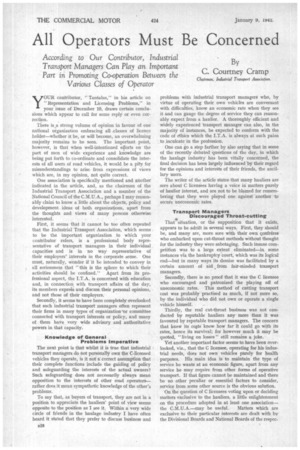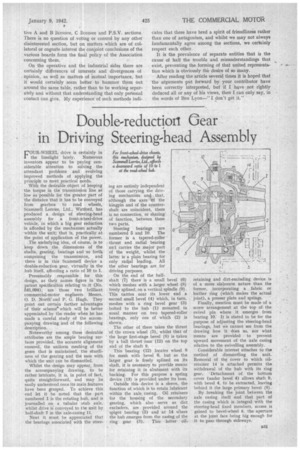All Operators Must Be Concerned I " OUR contributor, "Tantalus," in his article on li , "Representation and Licensing Problems," in
Page 32

Page 35

If you've noticed an error in this article please click here to report it so we can fix it.
your issue of December 19, draws certain conclusions which appear to call for some reply or even cor rection. .
There is,a strong volume of opinion in favour of one national organization embracing all .classes of licence holder—whether it be, or will become, an overwhelming majority remains to be seen. The important point, however, is that when well-intentioned efforts on the Part of men of wide experience and knowledge are being put forth to co-ordinate and consolidate the interests of all users of road vehicles, it would be a pity for misunderstandings to arise from expressions of views which are, in my opinion, not quite correct.
One association is specifically mentioned and another indicated in the article, and, as the chairman of the Industrial Transport Association and a member of the National Council of the C.M.U.A., perhaps I may reasonably claim to know a little about the objects, policy and development ideas of both organizations, apart from the thoughts and views of many persons otherwise interested. • First, it seems that it cannot be too often repeated that the Industrial Transport Association, which seems to be the important organization to which your contributor refers, is a professional body representative of transport managers in their individual capacities and is in no way representative of their employers' interests in the corporate sense. One must, naturally, wonder if it be intended to convey in all seriousness that "this is the sphere to which their activities should be confined." Apart from its professional aspect, the I.T.A. is concerned with education and, in connection with transport affairs of the day, its members expreSS and discuss their personal opinions, and not those of their employers.
Secondly, it seems to have been completely overlooked that such industrial transport managers often represent their firms in many types of organization or committee connected with transport interests or policy, and many of them have very wide advisory and authoritative powers in that capacity.
Knowledge of General Problems Imperative
The next point is that whilst it is true that industrial transport managers do not personally own the C-licensed vehicles they operate, is it not a correct assumption that their complete functions include the guiding of policy and safeguarding the interests of the actual owners? Such safeguarding does not necessarily always mean opposition to the interests of other road operators— rather does it mean sympathetic knowledge of the other's problems.
To say that, as buyers of transport, they are not in a position to appreciate the hauliers' point of view seems opposite to the position as I see it. Within a very wide circle of friends in the haulage industry I have often heard it stated that they prefer to discuss business and problems with industrial transport managers who, by virtue of operating their own vehicles are conversant with difficulties, know an economic rate when they see it and can gauge the degree of service they can reasonably expect from a haulier. A thoroughly efficient and widely experienced transport manager can also, in the majority of instances, be expected to conform with the code of ethics which the I.T.A. is always at such pains to inculcate in the profession.
One can go a step farther by also saying that in some of the recently debated questions of the day, in which the haulage industry has been vitally concerned, the final decision has been largely influenced by their regard for the opinions and interests of their friends, the ancillary users.
The writer of the article states that many hauliers are sore about C licensees having a voice in matters purely of haulier interest, and are not to be blamed for remembering that they were played one against another to secure uneconomic rates.
Transport Managers Discouraged Throat-cutting •
That situation, or the supposition that it exists, appears to be adrift in several ways. First, they should be, and many are, more sore with their own confreres who embarked upon cut-throat methods without thought for the industry they were sabotaging. Such insane competition was to a large extent eliminated—in, some instances via the bankruptcy court, which was its logical end—but in many ways its demise was facilitated by a certain amount of aid „ from fair-minded transport managers.
Secondly, there is no proof that it was the C licensee who encouraged and patronized the playing off of uneconomic rates. This method of cutting transport cost was probably practised as much, if not more so, by the individual who did not own or operate a single vehicle himself.
Thirdly, the real cut-throat business was not conducted by reputable hauliers any more than it was favoured by reputable transport managers. The concern that knew its co$s knew how far it could go with its rates, hence its survival; for however much it may be quoted, "living on losses" still remains a joke.
Yet another important factor seems to have been overlooked, viz., that the C licensee, operating for his industrial needs, does not own vehicles purely for health purposes. His main idea is to maintain the type of service he wants at an economic figure, apart from any service he may require from other forms of operative transport. If that figure cannot be maintained and there be no other peculiar CT essential factors to consider, service from some other source is the obvious solution.
On the question of C licensees voting upon or deciding matters exclusive to the hauliers, a little enlightenment on the procedure adopted in at least one association—
the C.M.U.A.—may be useful. Matters which are exclusive to their particular interests are dealt with by the Divisional Boards and National Boards of the respec tive A and B licensee, C licensee and P.S.V. sections. There is no question of voting or control by any other disinterested section, but on matters which are of collateral or cognate interest the conjoint conclusions of the various boards form the final policy of the Association concerning them.
On the operative and the industrial sides there are certainly differences of interests and divergences of opinion, as well as matters of mutual importance, but it would certainly seem better to hammer them out around the same table, rather than to be working separately and without that understanding that only personal contact can give. My experience of such methods indi cates that these have bred a spirit of friendliness rather than one of antagonism, and whilst we may not always fundamentally agree among the sections, we certainly respect each other.
It is the prevalence of separate entities that is the cause' of half the trouble and misunderstandings that exist, preventing the forming of that united representation which is obviously the desire of so many.
After reading the article several times it is hoped that the arguments put forward by your contributor have been correctly interpreted, but if I have not rightly deduced all or any of his views, then I can only say, in the words of Ben Lyon—" I don't get
























































